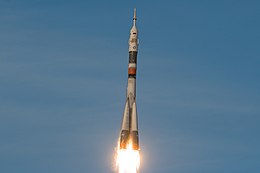Soyuz MS-11
2018 Russian crewed spaceflight to the ISS
 The launch of Soyuz MS-11 | |
| Operator | Roscosmos |
|---|---|
| COSPAR ID | 2018-098A |
| SATCAT no. | 43756 |
| Mission duration | 203d 15h 15m 58s[1] |
| Distance travelled | 86,430,555 statute miles [2] |
| Orbits completed | 3264[1] |
| Spacecraft properties | |
| Spacecraft type | Soyuz-MS 11F747 No. 741 |
| Manufacturer | RKK Energia |
| Crew | |
| Crew size | 3 |
| Members | Oleg Kononenko Anne McClain David Saint-Jacques |
| Callsign | Antares |
| Start of mission | |
| Launch date | 3 December 2018, 11:31 UTC[3] |
| Rocket | Soyuz-FG |
| Launch site | Baikonur Pad 1/5 |
| End of mission | |
| Landing date | 25 June 2019, 02:47:50 UTC [1] |
| Landing site | 148 km SE of Dzheskasgan [1] |
| Orbital parameters | |
| Reference system | Geocentric |
| Regime | Low Earth |
| Inclination | 51.6º[1] |
| Docking with ISS | |
| Docking port | Poisk zenith |
| Docking date | 3 December 2018, 17:33 UTC |
| Undocking date | 24 June 2019, 23:25:30 UTC [1] |
| Time docked | 203d 5h 52m |
 (l-r) McClain, Kononenko and Saint-Jacques Soyuz programme (Crewed missions) ← Soyuz MS-10 Soyuz MS-12 → | |
Soyuz MS-11 was a Soyuz spaceflight that launched on 3 December 2018, marking the 100th orbital launch of the year.[3] Originally scheduled for 20 December, the launch date was advanced to 3 December following the failure of Soyuz MS-10.[4] MS-11 was the 140th flight of a Soyuz spacecraft and carried the three members of the Expedition 58 crew to the International Space Station. The crew consisted of a Russian commander, and an American and a Canadian flight engineer.[3]
Crew
| Position | Crew member | |
|---|---|---|
| Commander |  Oleg Kononenko, RSA Oleg Kononenko, RSAExpedition 58 Fourth spaceflight | |
| Flight Engineer 1 |  David Saint-Jacques, CSA David Saint-Jacques, CSAExpedition 58 First spaceflight | |
| Flight Engineer 2 |  Anne McClain, NASA Anne McClain, NASAExpedition 58 First spaceflight | |
Backup crew
| Position | Crew member | |
|---|---|---|
| Commander |  Aleksandr Skvortsov, RSA Aleksandr Skvortsov, RSA | |
| Flight Engineer 1 |  Luca Parmitano, ESA Luca Parmitano, ESA | |
| Flight Engineer 2 |  Andrew R. Morgan, NASA Andrew R. Morgan, NASA | |
References
- ^ a b c d e f Soyuz MS-11
- ^ File:Statistics from the Exp 58 and 59 crew.png
- ^ a b c Gebhardt, Chris. "100th orbital launch of 2018: International trio set for launch to Space Station – NASASpaceFlight.com". NASASpaceflight.com. Retrieved 3 December 2018.
- ^ "Назначены даты отправки и возвращения с МКС космонавтов после аварии на Байконуре" [Dates assigned for next flights of cosmonauts to and from the ISS after the Baikonur incident] (in Russian). Interfax. October 21, 2018. Retrieved October 22, 2018.
- v
- t
- e
- Soyuz (rocket family)
- Soyuz (spacecraft)
- Baikonur Cosmodrome
- Soyuz abort modes
- Cosmonaut ranks and positions

(by spacecraft type)
| Soyuz 7K-OK (1966–1970) |
|
|---|---|
| Soyuz 7K-L1 (1967–1970) (Zond lunar programme) | |
| Soyuz 7K-L1E (1969–1970) | |
| Soyuz 7K-LOK (1971–1972) | |
| Soyuz 7K-OKS (1971) | |
| Soyuz 7K-T (1972–1981) | |
| Soyuz 7K-TM (1974–1976) | |
| Soyuz 7K-S (1974–1976) |
|
| Soyuz-T (1978–1986) | |
| Soyuz-TM (1986–2002) | |
| Soyuz-TMA (2002–2012) | |
| Soyuz-TMA-M (2010–2016) | |
| Soyuz MS (2016–present) |
- 2024
Uncrewed missions are designated as Kosmos instead of Soyuz; exceptions are noted "(uncrewed)".
The † sign designates failed missions. Italics designates cancelled missions.
The † sign designates failed missions. Italics designates cancelled missions.













